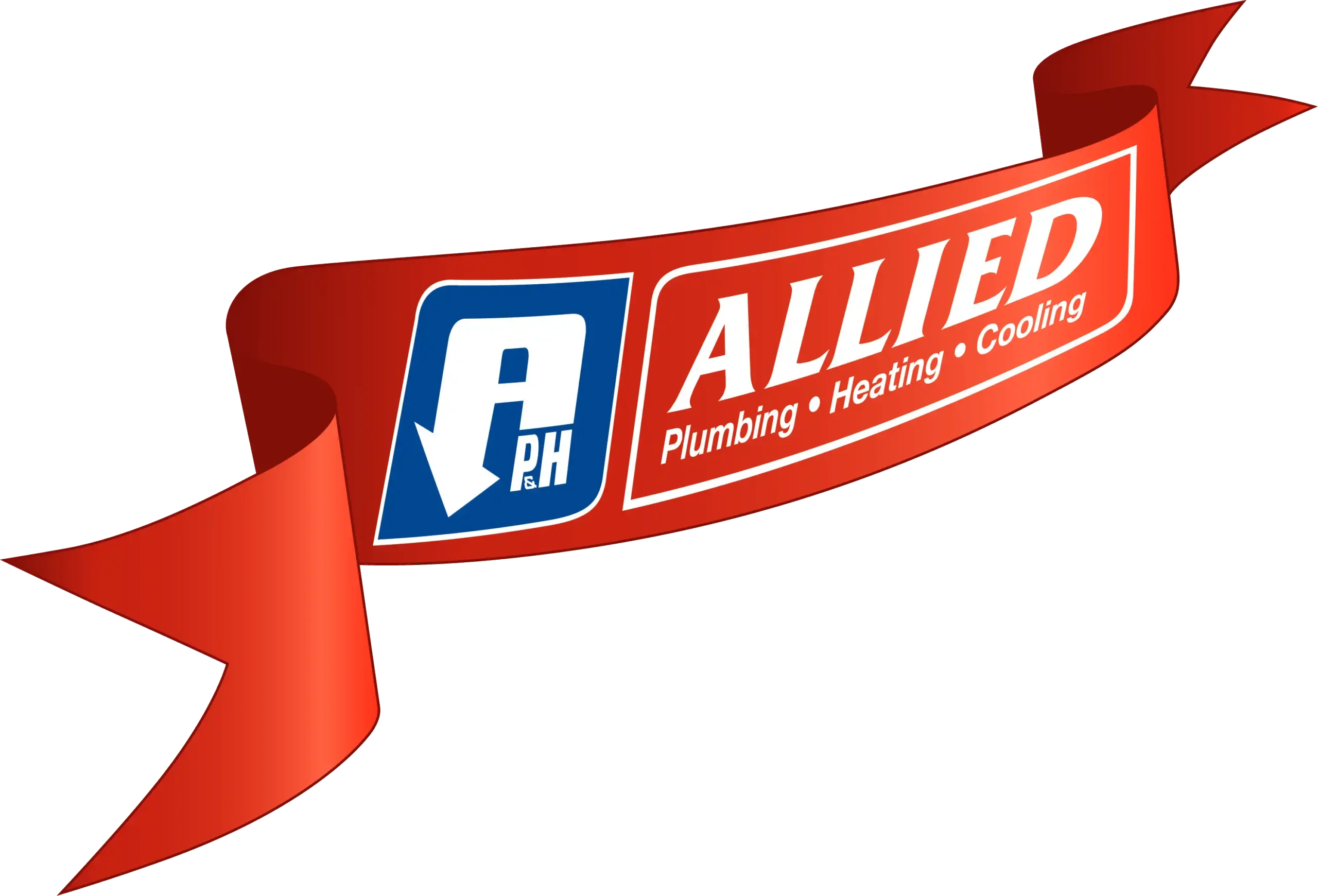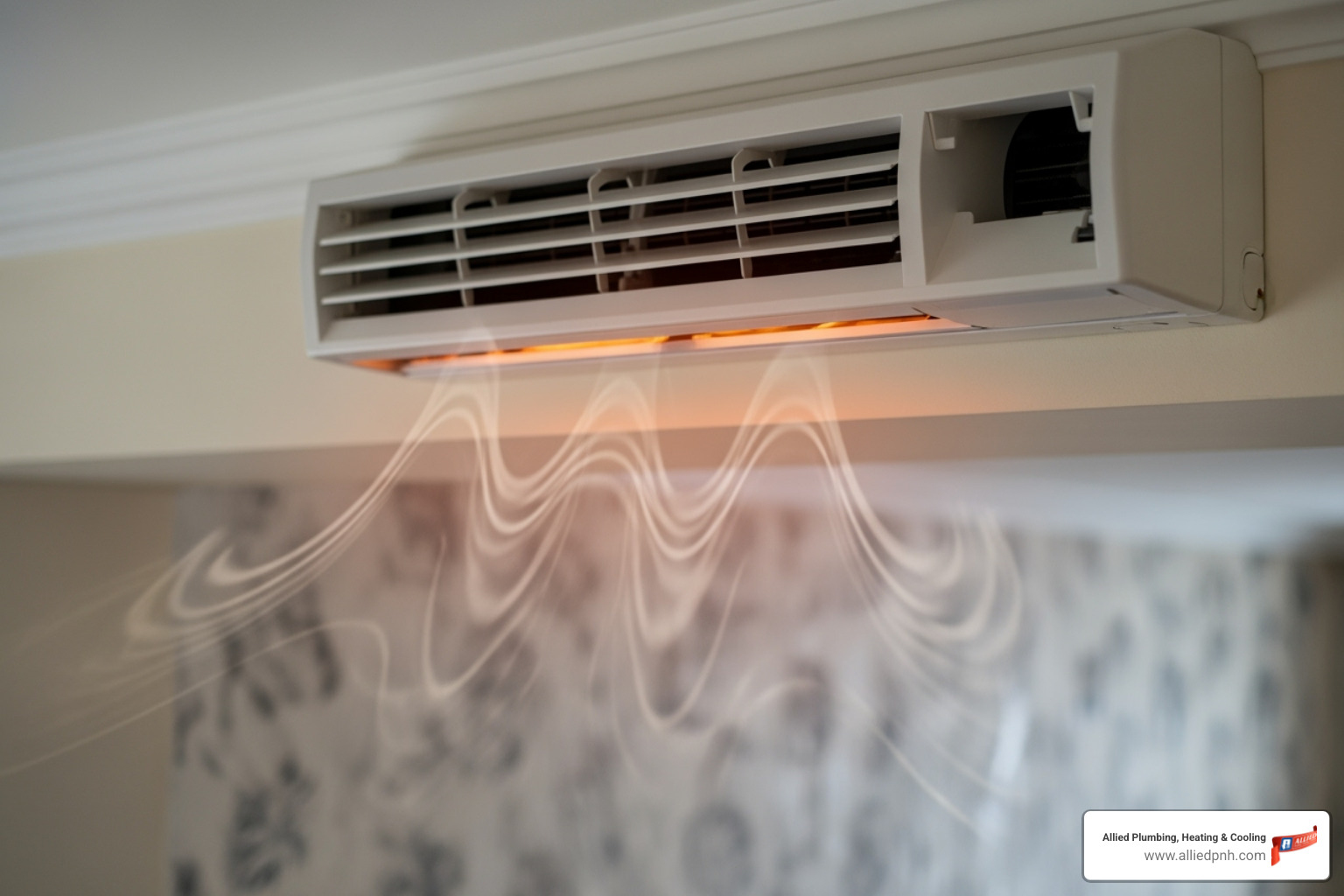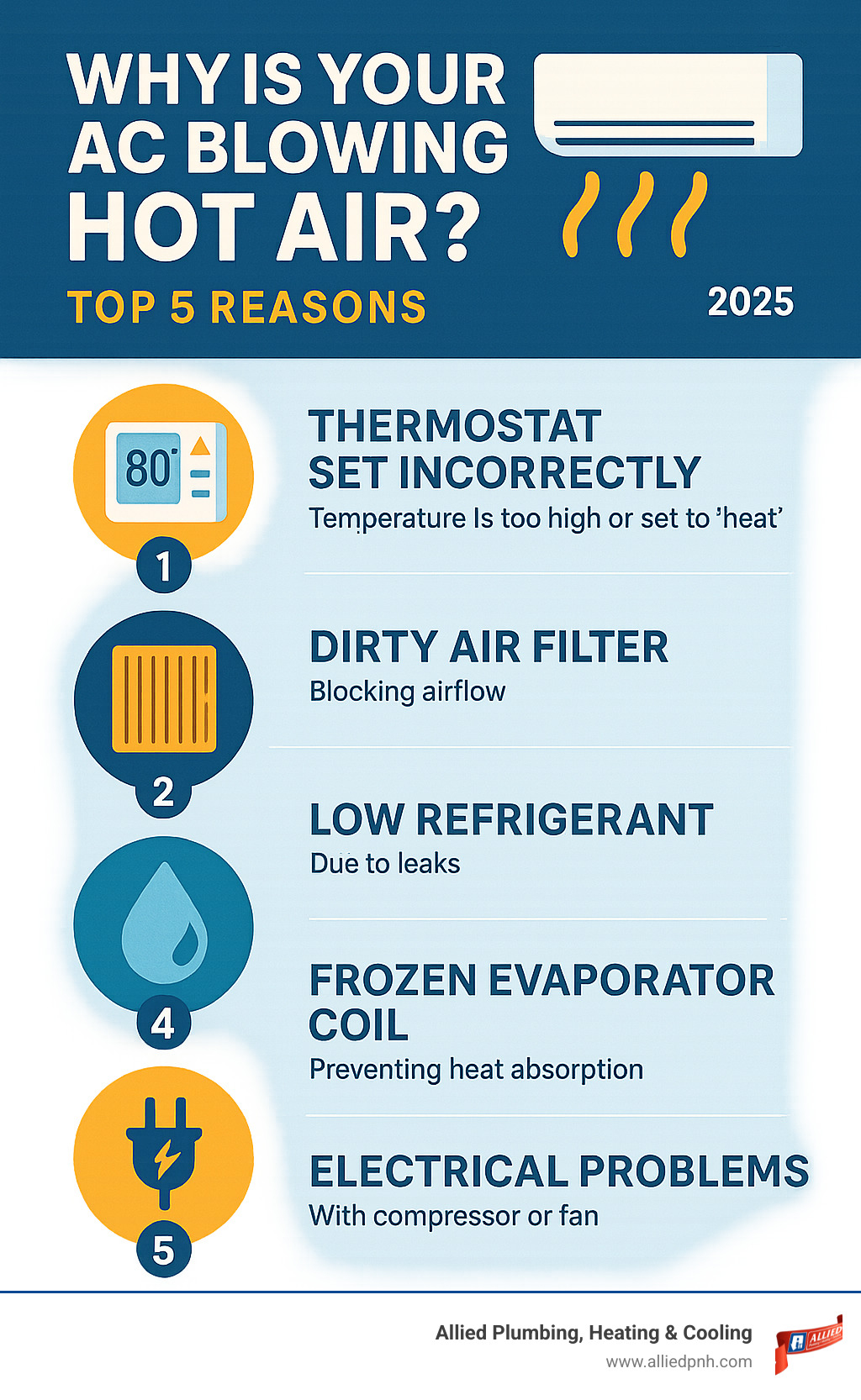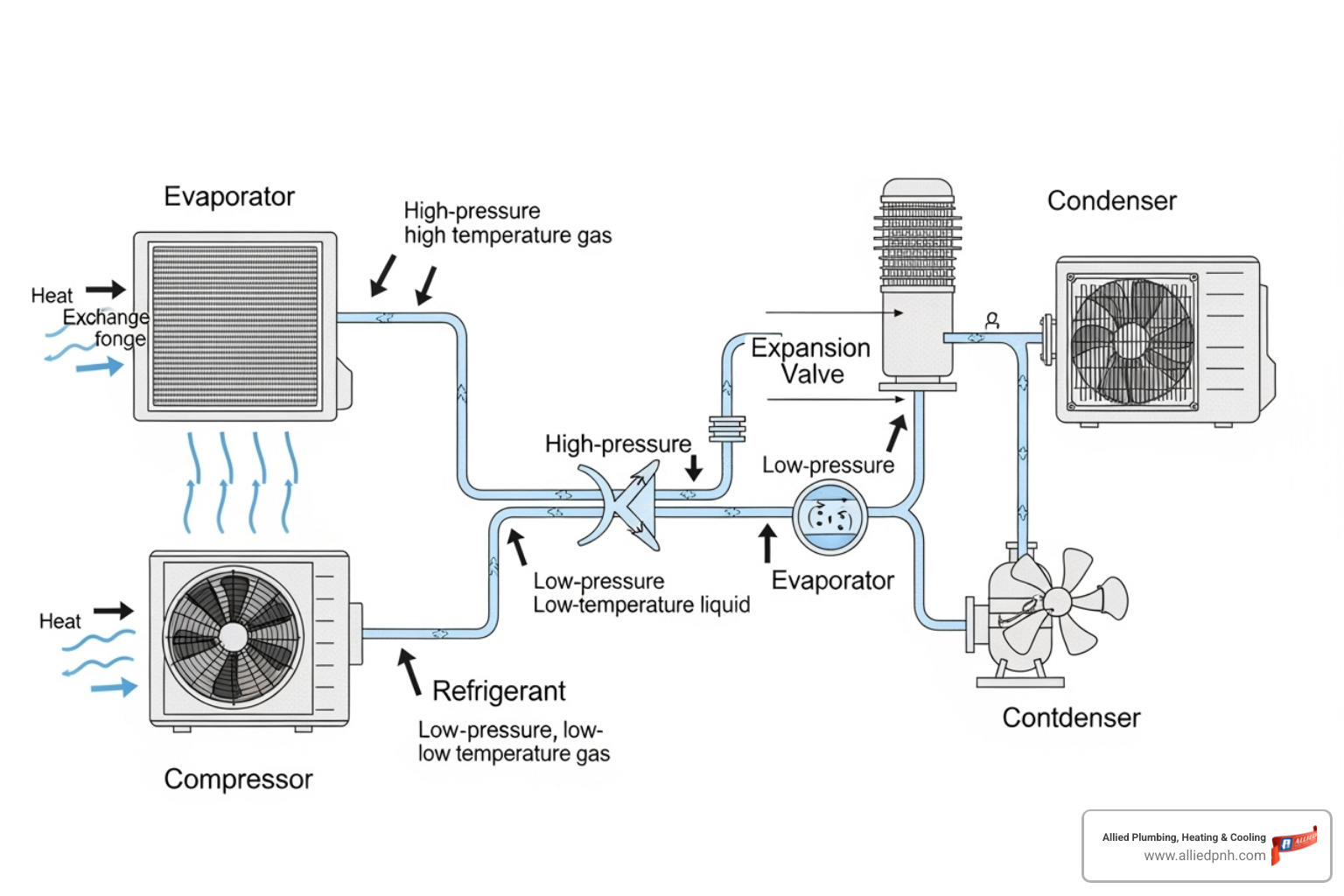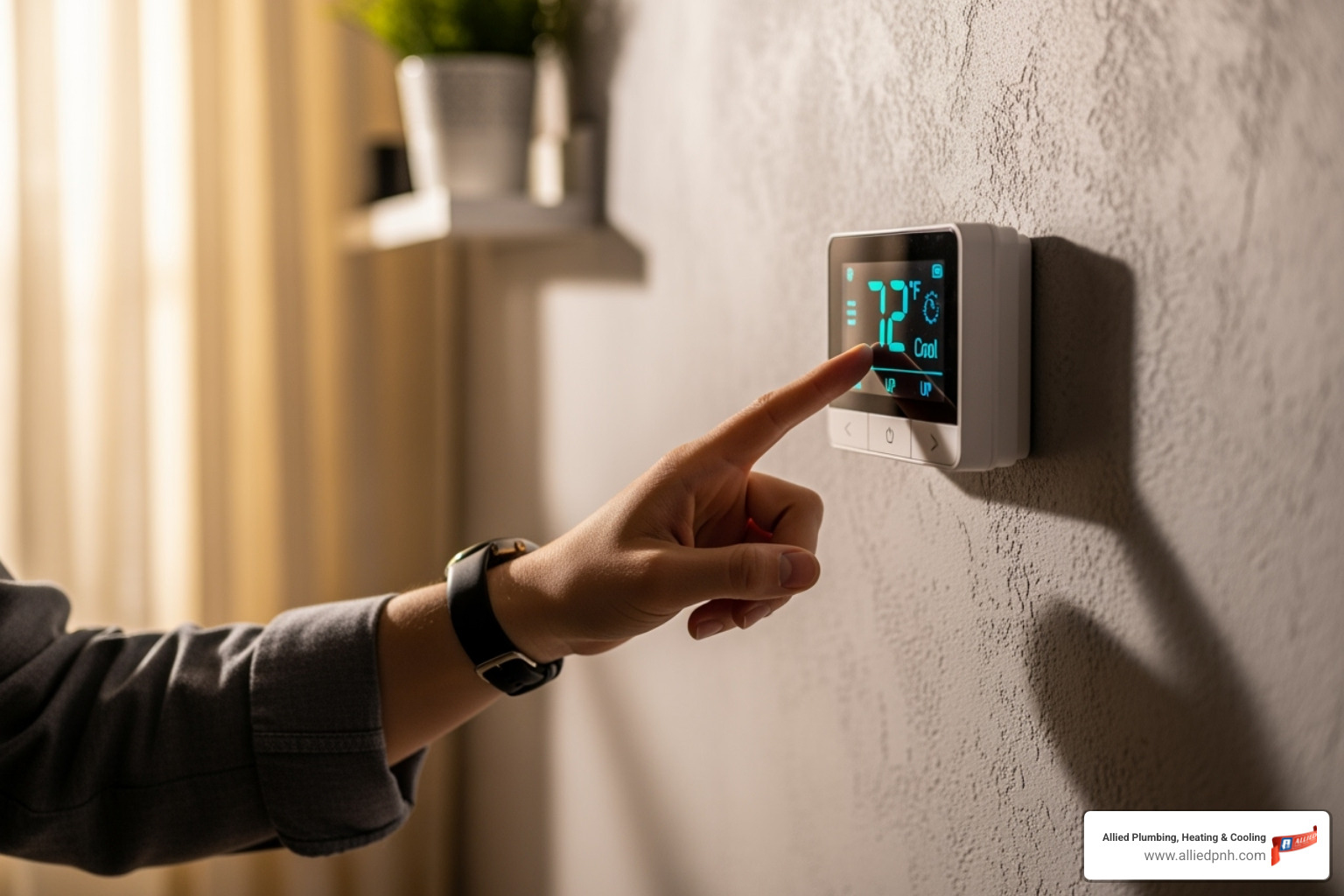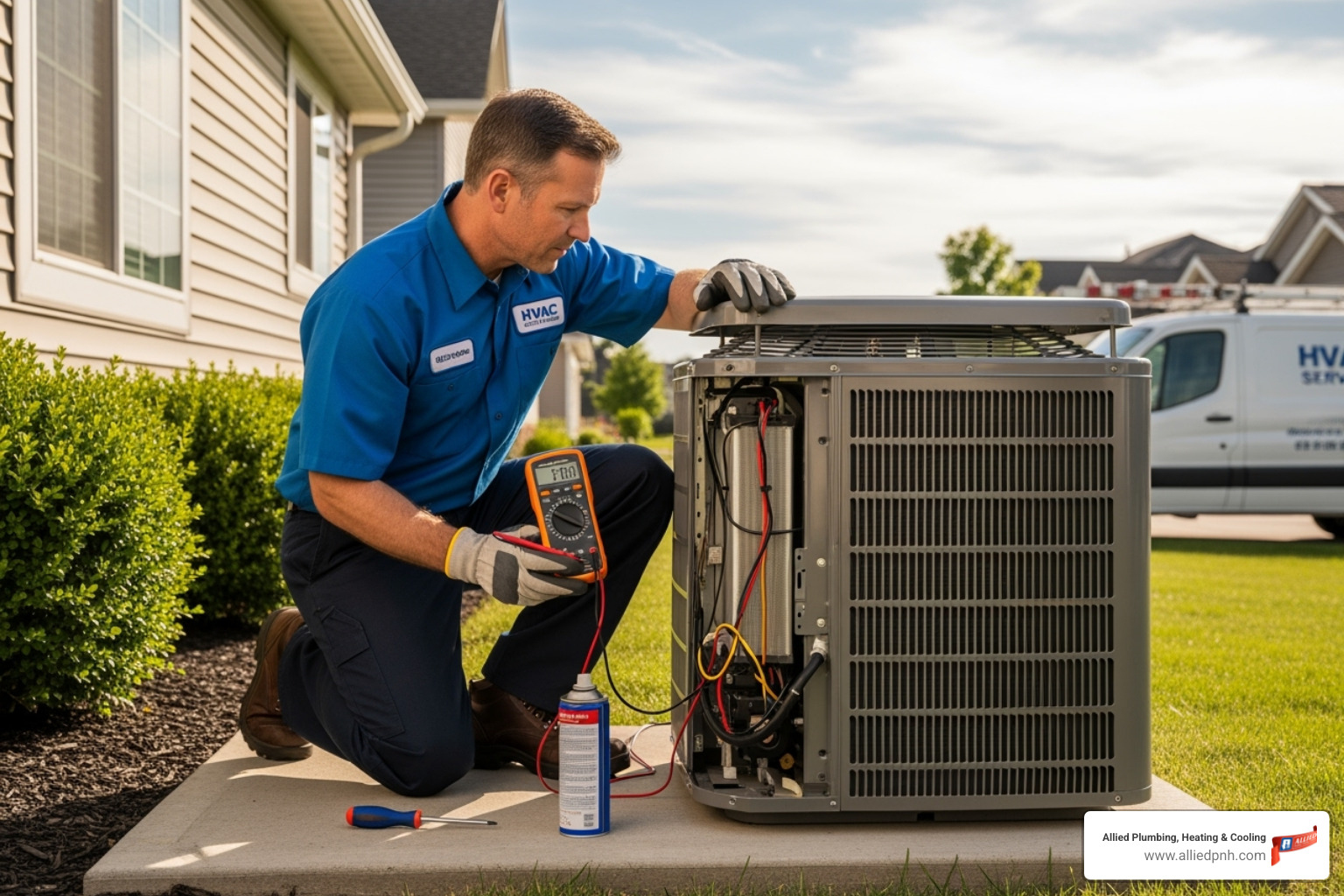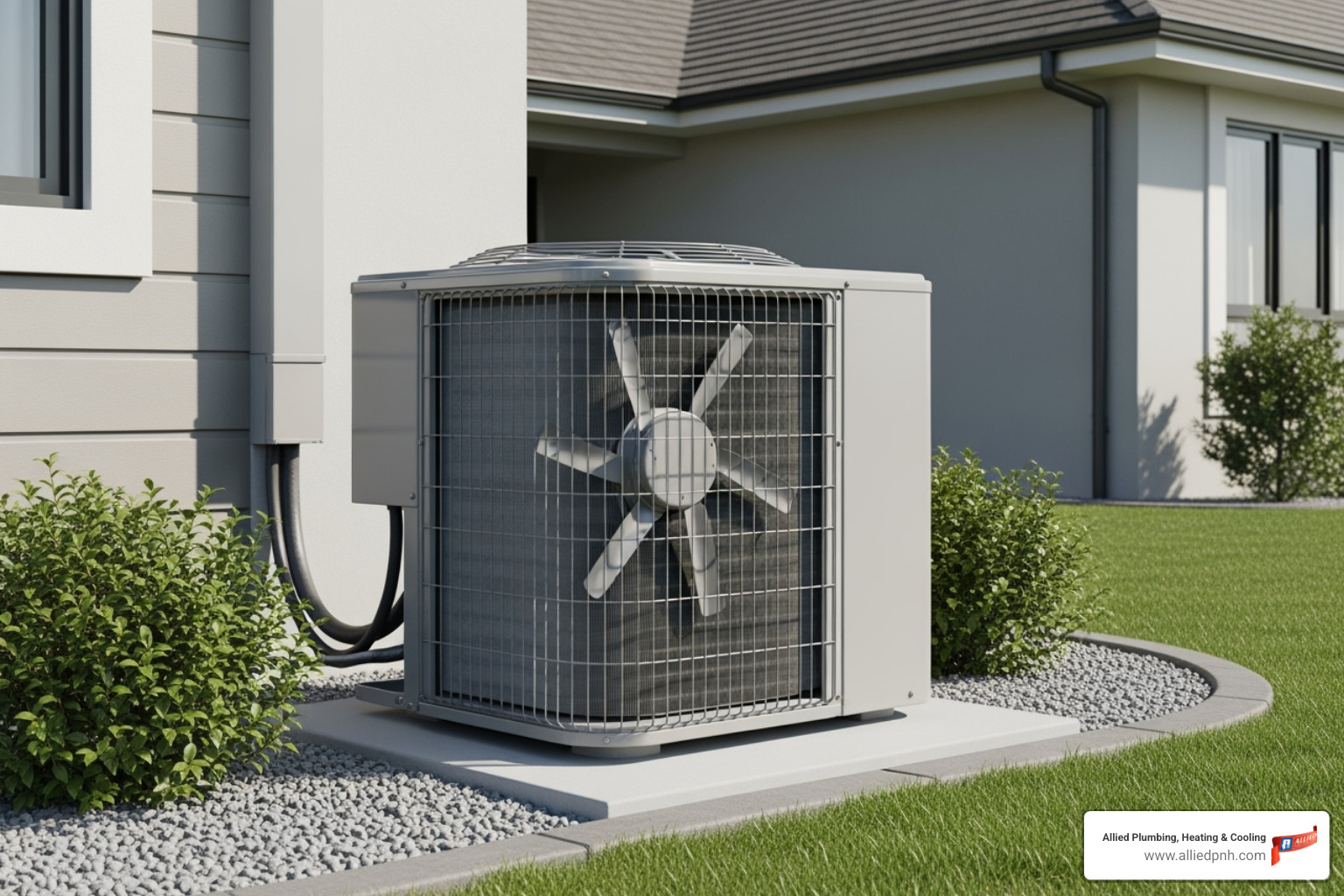When Your AC Blows Hot Air Instead of Cool Relief
An AC blowing hot air is a frustrating problem on a hot day. When you expect cool relief and get warm air, your home quickly becomes uncomfortable.
Common causes of AC blowing hot air:
- Thermostat issues – Wrong settings or dead batteries
- Dirty air filter – Restricting airflow and causing system problems
- Low refrigerant – Due to leaks in the system
- Frozen evaporator coil – From poor airflow or refrigerant issues
- Electrical problems – Faulty components or tripped breakers
- Compressor failure – The heart of your cooling system has stopped working
The good news is that some of these issues have simple DIY fixes. This guide provides step-by-step troubleshooting, from easy checks to more complex problems that require professional service to avoid system damage or safety risks.
Don’t let hot air ruin your comfort. Let’s get your AC back to keeping you cool.
How Your Air Conditioner Cools Your Home
Before fixing your AC blowing hot air, it helps to understand that your AC moves heat from inside your home to the outside—it doesn’t create cold air. This process, called heat exchange, involves an indoor unit and an outdoor unit working together through the refrigerant cycle.
Here’s how it works:
- Inside: The blower fan pulls warm air over the evaporator coil. Cold refrigerant inside absorbs the heat, and the newly cooled air is circulated through your home.
- Outside: The now-warm refrigerant travels to the compressor, which pressurizes it. It then moves to the condenser coil, where a fan helps release the heat outdoors.
- The refrigerant cools, turns back into a liquid, and returns inside to repeat the cycle.
When any part of this process breaks down—from the evaporator coil to the compressor—you might get hot air from your vents. Understanding this basic process provides a solid foundation for troubleshooting. For a deeper dive, you can explore the technical details of how an air conditioner works.
Simple Troubleshooting Steps You Can Take First
Before calling a professional, try these simple troubleshooting steps. Your AC blowing hot air might have an easy fix you can handle in minutes, saving you time and money. These basic checks don’t require special tools and are the first things a technician would look at.
Check Your Thermostat Settings
Thermostat mix-ups are a common cause of AC issues.
- Mode Setting: Ensure it’s set to “Cool,” not “Heat.”
- Fan Setting: Set the fan to “AUTO,” not “ON.” The “ON” setting runs the fan constantly, circulating unconditioned air between cooling cycles. “AUTO” only runs the fan when the AC is actively cooling.
- Batteries: For digital thermostats, check for dead batteries, which can cause malfunctions. If you have a smart thermostat, you might be facing smart thermostat connection issues.
- Temperature: Make sure the temperature is set several degrees below the current room temperature, or the AC won’t turn on.
Inspect and Change the Air Filter
A dirty air filter is a top cause of cooling problems. It traps dust and debris, but when it gets clogged, it restricts airflow over the evaporator coil. This forces your system to work harder and can cause the evaporator coil to get too cold and freeze up. An iced-over coil cannot absorb heat, resulting in warm air from your vents.
How often should you change your filter? Generally every 1-3 months, but check it monthly. Change it more often if you have pets or allergies. Warning signs of a clogged filter include reduced airflow, dust buildup, higher energy bills, or unusual noises.
Check the Outdoor Unit and Power Supply
Your outdoor unit needs power and clear airflow to work.
- Power: Check the circuit breaker for your AC in your electrical panel. If it’s tripped, flip it off and then on again. If it trips again immediately, you have a serious electrical issue that needs a professional. Learn more about what to do if your AC keeps tripping your circuit brebreaker. Also, check the outdoor disconnect switch near the unit and ensure it’s “ON.”
- Airflow: Inspect the outdoor unit for debris. Clear away leaves, weeds, and overgrown bushes, ensuring at least two feet of open space around it. If the coil itself is dirty, turn off the power at the disconnect switch and gently rinse it with a garden hose. A clean unit is essential to prevent overheating.
Why Your AC is Blowing Hot Air: Common Problems Requiring a Pro
If the simple fixes didn’t work and your AC is still blowing hot air, you’re likely facing a more complex issue. These problems require professional diagnosis, as DIY repairs can be dangerous and lead to more expensive damage. Our trained technicians have the specialized tools and knowledge to handle these challenges safely.
Low Refrigerant Levels
Refrigerant isn’t consumed like fuel; if levels are low, you have a leak. This is a very common reason for an AC blowing hot air. Low refrigerant means your system can’t absorb heat effectively. Signs of a leak include hissing or bubbling sounds or ice on the refrigerant lines. This is not a DIY fix. Handling refrigerant requires certification, and simply adding more without fixing the leak will lead to compressor failure. Our technicians can locate and repair leaks and safely recharge your system. For more warning signs, see our guide on How to Know When AC Has Refrigerant Issues.
What to Do When Your AC is Blowing Hot Air Due to a Frozen Coil
It seems contradictory, but a frozen evaporator coil is a common reason your AC is blowing hot air. The ice prevents the system from cooling. The main causes are restricted airflow (from a dirty filter or blocked vents) or low refrigerant levels. If you see ice on your indoor unit, turn the AC off and switch the fan to “ON” to melt the ice. Never scrape the ice off. After it thaws, you can restart the AC. If it freezes again, an underlying problem needs professional attention. Repeated freezing can lead to moisture issues and musty smells from potential mold growth. Learn more in our guide on Why is Your AC Freezing Up During Hot Weather?
Electrical Problems and Faulty Components
Your AC has many electrical components, and a failure in any one of them can cause it to blow hot air.
- Compressor Failure: This is the most serious issue. Signs include a humming outdoor unit that won’t run or a frequently tripping breaker.
- Capacitor Problems: These are common. A bad capacitor provides startup power to motors. You might hear a buzzing or humming sound, but the fan or compressor won’t start. Learn more about Why is Your AC Making a Buzzing Sound?.
- Blower Motor Issues: These result in weak or no airflow from vents and can contribute to a frozen coil.
- Condenser Fan Failure: This prevents the outdoor unit from releasing heat, causing it to overheat and shut down.
The bottom line: safety first. Electrical repairs are dangerous and require a trained professional to avoid injury and further damage to your system.
The Importance of Regular AC Maintenance
Think of your AC like a car—it needs regular tune-ups to run smoothly and avoid problems like AC blowing hot air. Routine maintenance prevents many emergency calls.
Preventative care catches small issues before they become expensive problems. A technician can spot a dirty coil or a failing capacitor early, preventing a system failure. Regular maintenance protects your investment, extending your AC’s lifespan to 15-20 years and helping you avoid major repair bills.
Energy efficiency is another key benefit. A clean, well-maintained system works less hard, runs more smoothly, and uses less electricity, lowering your bills.
During our professional tune-ups, we:
- Clean indoor and outdoor coils
- Check refrigerant levels and inspect for leaks
- Examine all electrical components, wiring, and connections
- Lubricate moving parts
- Verify proper airflow and thermostat accuracy
The peace of mind from regular maintenance is priceless, reducing the likelihood of a breakdown on the hottest day of the year. Learn more in our guide to AC Maintenance for Year-Round Comfort. Regular maintenance is one of the smartest investments you can make in your home’s comfort.
Frequently Asked Questions about an AC Blowing Hot Air
When your air conditioning starts acting up, you probably have a lot of questions. Let’s tackle the most common questions we get about AC blowing hot air issues.
Should I turn off my AC if it is blowing warm air?
Yes, turn it off immediately. Running a malfunctioning AC can cause more severe issues. Shutting it down helps prevent further damage to components like the compressor, the heart of your AC. Continuing to run the system puts extra strain on the compressor, which can cause it to fail, leading to an expensive replacement. You’re also wasting energy and money. After turning it off, try the simple troubleshooting steps we covered. If they don’t work, call for a professional inspection to fix the small issue before it becomes a major one.
Can a dirty air filter really cause my AC to blow hot air?
Yes, a dirty air filter can indirectly cause your AC to blow hot air. It creates a domino effect. A clogged filter restricts airflow over the evaporator coil. Without enough warm air to absorb heat from, the evaporator coil gets too cold and freezes into a block of ice. The ice blocks heat absorption, so the air pushed over it doesn’t get cooled. Instead, you feel warm air blowing from your vents. If you’re experiencing this, check out our guide on Why AC is Running But Not Cooling Your Home for more details.
What are the risks of running an AC that is blowing hot air?
Running an AC that’s blowing warm air is risky and can lead to bigger problems.
- Compressor Damage: This is the biggest risk. The extra strain can cause the compressor to fail, leading to a major repair or system replacement.
- Increased Energy Bills: The system runs longer without cooling, wasting electricity.
- Worsening Problems: The underlying issue will worsen if ignored. A small leak can become a big one, and a minor electrical issue can cause a major failure.
- Water Damage: A frozen coil can lead to water damage when it melts, potentially overflowing the drain pan.
- Shortened Lifespan: All this stress shortens the AC’s lifespan, forcing a premature replacement. These issues can be Signs It’s Time for an AC Replacement.
The bottom line? Turn off the AC and call a professional to solve the problem quickly.
Get Your Cool Air Back with Professional Help
When your AC blowing hot air makes your home uncomfortable, you want a fast solution. We’ve covered simple DIY fixes and complex issues like refrigerant leaks or frozen coils that require a pro.
Starting with basic troubleshooting can save you time and money. But if you’ve tried the DIY checks and still have warm air, it’s time to call the experts. Don’t be discouraged; issues with refrigerant, electrical systems, or frozen coils are best left to professionals for safety and to ensure a proper fix.
At Allied Plumbing, Heating & Cooling, we’ve been helping families stay comfortable since 1977. Our long-term customer loyalty and commitment to reliable, prompt service show you can trust us to get it right the first time. We serve homeowners throughout the Springfield Area, including Chatham, Rochester, and Pleasant Plains, Illinois, and our work is backed by the Daikin Comfort Promise.
If you’re still sweating it out, don’t suffer another minute. Contact us for professional AC repair in Sherman and let us restore the cool comfort you deserve. Your relief is just a phone call away!
